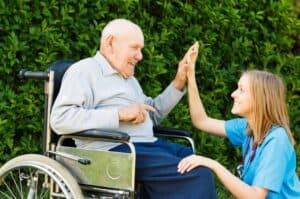
8 Memory Care Requirements That You Need to Consider Before Committing Your Loved One
Have you noticed a decline in cognitive and memory abilities as your loved one ages? In some individuals, this decline can be more pronounced, resulting
Dementia is a progressive condition with symptoms ranging from relatively mild to severe with time. When you notice your loved one struggling with memory, problem-solving, language, and changes in their perception and behavior, it could indicate different forms of dementia.
As the condition deteriorates, your loved one will need more care, and with time, they may require full support in managing their activities of daily living, like bathing, eating, and grooming. However, you should note that dementia comes in different forms for each person, and this will determine the type of care they will need.
There are several stages of dementia, and understanding each stage will help you plan your loved one’s care. Since each stage has different symptoms, you and your family will better understand what is happening to them and plan accordingly.

The progression of dementia worsens with time, although the rate of the progression differs with individuals. Typically, a person with dementia can live up to 20 years after their diagnosis, but this will depend on other factors.
Dementia is a condition that results from changes in the brain. These changes in the brain can occur without any noticeable signs in your loved one during the early stages of the disease.
There are seven stages of dementia, although they are categorized into three phases:
In this stage, your loved one can live independently since there are no visible signs. There will be no noticeable cognitive loss, and your loved one will be able to perform their activities of daily living without assistance.
During this stage, you will notice behavioral changes in your love that you can mistake for age-related forgetfulness. You will also notice behavior changes and mood swings significantly affecting your loved one’s personality.
This is the final stage, accompanied by a severe decline in a person’s physical and cognitive abilities. You will notice severe memory loss, incontinence, and mobility issues.
Caring for a loved one with dementia can be challenging, especially if you don’t know what to expect during each stage.
The following are the seven stages of dementia and their symptoms:
Stage 1: No noticeable cognitive impairment (this stage looks normal with no noticeable cognitive decline.)
Stage 2: Very mild noticeable cognitive decline (you will notice mild forgetfulness, like your loved one forgetting where they kept their keys or inability to recall family members names).
Stage 3: Mild noticeable cognitive decline and impairment (you will notice that cognitive decline is more regular. For example, your loved one may get lost while traveling to a familiar place, forgetting essential appointments that they wouldn’t usually forget)
Stage 4: Moderate cognitive decline (you will notice a change in your loved one’s personality, social withdrawal, mood swings, forgetting the recent past, and denial of these symptoms)
Stage 5: Moderately severe physical and cognitive impairment (inability to perform ADLs, forgetfulness, wandering off, sundowning, confusion)
Stage 6: Severe physical and cognitive decline (need help with ADLs, sleeping difficulties, incontinence, severe memory loss, paranoia, and delusions)
Stage 7: Very severe physical and cognitive decline (Communication problems, your loved one may be unable to speak or understand what you are saying, mobility issues, incontinence, weight loss, behavior changes)
You must understand the needs of your loved one in order to develop an appropriate care plan for them. You need to understand their hobbies, social interests, and lifestyle to achieve this.
One way to ensure a quality physical health and care is by re-establishing old skills that may be preserved. For instance, you can involve your loved one in buttering bread; if they can rake the garden, let them help.
Encourage your loved one to do something small as their responsibility, as this will make them feel valuable.
During late-stage dementia, your loved one may have difficulties in eating, which could significantly lead to weight loss and deterioration of their condition. You will need to find out if they are having difficulties swallowing food and develop alternative feeding methods.
If swallowing is a concern, you can give your loved one soft food rather than pureed food. However, ensure the food your loved one takes is nutritious enough to meet their nutritional needs and, at the same time, is appealing.
Additionally, moisturize a senior’s mouth to ensure it is not sore and maintain good oral care. If your loved one doesn’t want to eat, do not force them; try other means, like making eating a game they love.

You will notice rapid changes in your loved one’s emotional responses as dementia progresses. Your loved one may have no control over how they express their feelings, which could take a toll on you as their caregiver.
You need to know and remember always that these behavior changes are due to the progression of dementia and the damage it has on the brain.
A senior may react in a way you were not expecting due to the decline in their reasoning or loss of memories. Try as much as possible to look beyond their emotions as they may be due to unmet needs and desires. Understanding your loved one, their history, and their lifestyle is essential, as this might help you anticipate their needs and meet them before they react.
Palliative and end-of-life care involves communicating with your loved one and helping them when necessary. It would help if you planned for your loved one’s palliative care when they can decide, and when they need these services, remember to honor their wishes.
During the last stage of dementia, your loved one may fail to recognize you and other family members. This can be very difficult for the whole family, making it hard to care for them as they may view you as an intruder and be afraid of you.
However, all is not lost, as there are ways that you can still help your loved one. They include:
As your loved one condition progresses, you will need to advance their care plan. Consider nursing home and palliative care if you can’t provide the necessary care. The advantage of palliative and end-of-life care is that you will know your loved one is in good hands, they will receive assistance with their ADLs, and at the same time, have easy access to medical care when they need it.

One of the most critical parts of caregiving is seeking support when needed. When you are in the right headspace, you can provide your loved one with the best care.
You can’t give your all if you are like a candle burning from both ends. You need a safe place to talk about your feelings, especially as your loved one nears their end.
When caring for a loved one who is in the last stages of dementia, you may experience the following overwhelming reactions:
There are lots of resources and online or physical support groups to help you cope during this trying time.
Various resources and support groups are available that you can get support from.
They include:

Caring for a loved one during the last stages of dementia could take a toll on anybody. It’s okay to feel overwhelmed, but you can prepare by learning more on the condition and seeking support when needed..
Remember to cherish the time you have with your loved one, knowing that the ability your loved one has today may be lost tomorrow. Let the good times you have with them take you through the darkest hour when you feel overwhelmed and like you can’t go on.
Be prepared for all the stages; when they come, look for support from people experiencing the same or have gone through the process. Seek professional help, and don’t shy away from expressing your feelings.
If you need an extra pair of hands to provide support for your loved one experiencing the last stages of dementia, Amy’s Eden’s compassionate and trained caregivers are just an email or call away. Contact us today to learn more about how we can assist.
Get care >

Have you noticed a decline in cognitive and memory abilities as your loved one ages? In some individuals, this decline can be more pronounced, resulting

When we think about healthcare for seniors, we might not think of sports therapists. They usually work with athletes and help them stay fit. However,

Are you considering physical therapy as a career option? Sometimes, you may or may not know what to expect once you become a certified physical

Do you find it harder to move around like you used to? Is chronic pain affecting your daily activities and overall quality of life? Do

Amy's Eden Senior Care © 2023